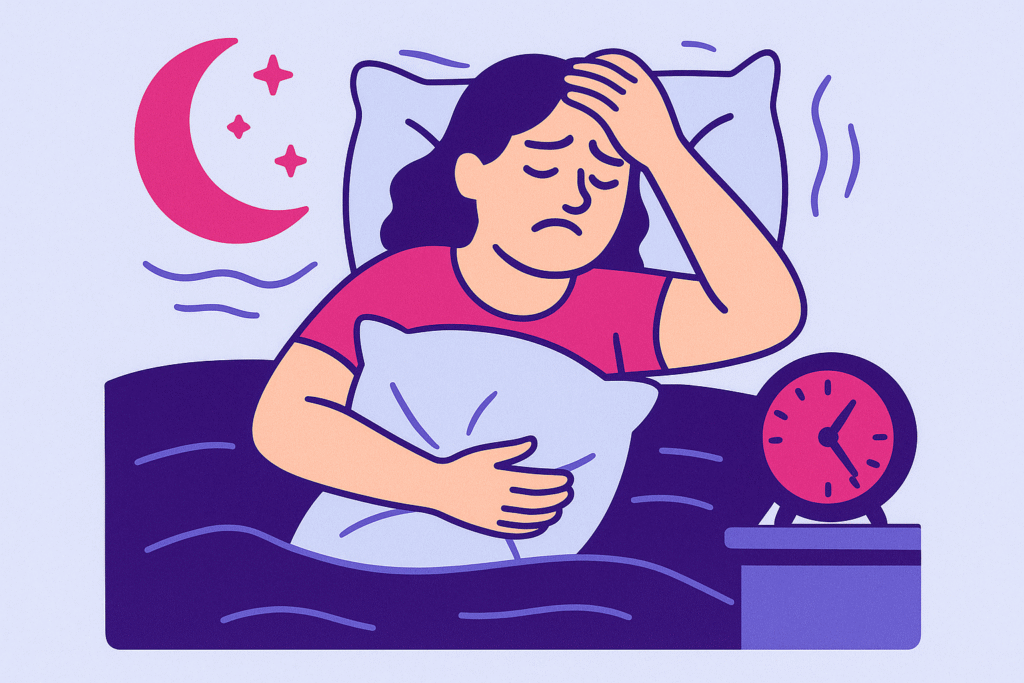Insomnia is one of the most commonly reported symptoms during menopause. Up to 40–60% of women over the age of 45 experience sleep problems – difficulty falling asleep, frequent nighttime awakenings, interrupted or unsatisfying sleep¹. Lack of restorative sleep affects not only daily energy levels but also mood, weight, immunity, and heart health. Fortunately, there are effective natural and medical methods to improve sleep quality during the climacteric period.
Why do women sleep worse during menopause?
1. Hormonal changes
A drop in estrogen and progesterone levels disrupts neurotransmitters responsible for sleep, such as serotonin and melatonin². Progesterone has a calming effect, so its deficiency may lead to increased agitation.
2. Hot flashes and night sweats
One of the most common causes of nighttime awakenings are vasomotor symptoms – sudden waves of heat, often accompanied by sweating and heart palpitations³.
3. Increased anxiety and stress
Menopause is a time of many challenges – changes in the body, health, and often family situations. Stress and anxiety increase cortisol – the stress hormone that disrupts circadian rhythms⁴.
4. Breathing disorders and urinary urgency
Changes in pelvic floor muscles and declining estrogen levels may worsen sleep apnea and nocturia⁵.
Effects of sleep deprivation during menopause
- Fatigue and poor concentration
- Irritability, mood swings, depression
- Increased appetite (especially for sweets) and easier weight gain
- Weakened immune system
- Higher risk of heart disease and type 2 diabetes⁶
How to improve sleep during menopause – effective methods
1. Sleep hygiene – the foundation of any therapy
- Maintain regular sleep and wake times – even on weekends
- Avoid screens (TV, phone, laptop) at least 1–2 hours before bed
- Ensure darkness and quiet in the bedroom, air it out before sleep
- Sleep in light pajamas under a breathable blanket
- Avoid heavy dinners, caffeine, and alcohol after 5:00 PM
- Practice bedtime rituals: a bath, reading a book, light meditation
2. Natural remedies for falling asleep
- Melatonin: a sleep hormone, may be used short- or long-term⁷
- Valerian, lemon balm, passionflower: calming and sedative herbs
- Magnesium: supports the nervous system, especially with vitamin B6
- L-theanine (from green tea): promotes relaxation without drowsiness
3. Reducing hot flashes and night sweats
- Use thermoregulating clothing and breathable bedding
- Consider phytoestrogen supplements (e.g., soy, red clover), which may reduce symptoms⁸
- In more severe cases, local or systemic estrogen therapy may be effective
4. Physical activity – but not late in the evening
- Regular movement improves sleep quality, but intense workouts after 6:00 PM may be stimulating
- Best types of activity: yoga, Pilates, walking, dancing
5. Psychological support and relaxation techniques
- Mindfulness and meditation – reduce stress and improve sleep quality
- Breathing exercises – e.g., 4-7-8 method: inhale 4 sec, hold 7 sec, exhale 8 sec
- Cognitive behavioral therapy for insomnia (CBT-I) – most effective for chronic sleep issues⁹
6. Sleeping pills – only as a short-term solution
In severe insomnia, a doctor may recommend short-term sleep aids (e.g., zolpidem, hydroxyzine), but they are not advised as a long-term strategy due to the risk of dependency and worsened sleep quality.
When to see a doctor?
It’s worth seeking help if:
- Sleep problems last longer than 4 weeks
- Insomnia negatively affects work or family life
- Symptoms of depression, anxiety, or irritability occur
- You notice signs of sleep apnea (snoring, sudden awakenings, choking sensation)
Summary
Sleep during menopause becomes a challenge, but it doesn’t have to be a source of frustration. Consistency, patience, and readiness to change habits are key. Improved sleep hygiene, herbs, diet, physical activity, and psychological support can genuinely restore peaceful nights – without medication. And if that’s not enough, consulting a doctor for individualized therapy is always a good step.
Przypisy
- Kravitz HM et al. Sleep difficulty in menopausal women: a community-based study. Obstet Gynecol. 2003.
- Freedman RR. Menopausal hot flashes: mechanisms, endocrinology, treatment. J Steroid Biochem Mol Biol. 2014.
- Thurston RC et al. Vasomotor symptoms: natural history and risk factors. Menopause. 2009.
- Baker FC et al. Sleep and menopause: mechanisms and treatment. Curr Opin Physiol. 2019.
- Bixler EO et al. Sleep disordered breathing in menopausal women. Am J Respir Crit Care Med. 2001.
- Spiegel K et al. Impact of sleep debt on metabolic and endocrine function. Lancet. 1999.
- Wade AG et al. Efficacy of melatonin in perimenopausal and menopausal women with insomnia. Climacteric. 2011.
- Lethaby A et al. Phytoestrogens for vasomotor menopausal symptoms. Cochrane Database Syst Rev. 2013.
- Edinger JD et al. Cognitive behavioral therapy for chronic primary insomnia. JAMA. 2001.

